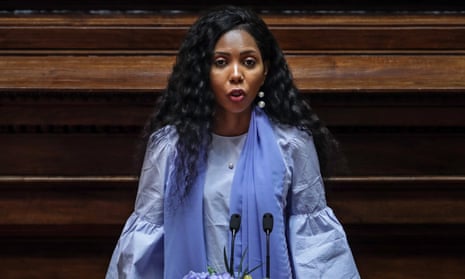Jaha Dukureh was a young mother of three with little campaigning experience when she started a movement in the Gambia to end female genital mutilation, backed by the Guardian.
In the seven years that followed she advised Barack Obama in the US, where she was then living, helped have FGM banned in her home country, was nominated for a Nobel peace prize and became a UN ambassador.
Now 31, she wants to defy expectations again, standing for president in the west African nation on 4 December, despite being a relative unknown on the political scene.
“I’ve always known that I wanted to serve, but in what capacity I wasn’t sure,” she says, via an intermittent internet call from the Gambia. “I’m a very passionate and emotional person [and] people always told me if you’re a leader, people can’t see emotions. But the older I get, the more I realise that that’s what makes me human, that’s how people connect with me.
“I am facing a lot of ageism, and a lot of sexism,” she says. “But for me, the fact that I even dare to say that I want to be president in the Gambia is statement enough – it is what girls need right now. It’s an answer to everyone that has ever questioned our ability to lead not only in Africa, but across the world.”
A newcomer to Gambian politics, Dukureh joined the People’s Democratic Organisation for Independence and Socialism (PDOIS) in March. The party was part of Coalition 2016 in the 2016 presidential election. Its candidate, Adama Barrow, defeated strongman Yahya Jammeh, who finally stepped down and left the country after 22 years of rule in 2016.
“The Barrow government has failed Gambia on multiple fronts,” says Dukureh. “We’ve had a regime change, but now we need a system change.”
Dukureh argues that support for healthcare, education and agriculture – alongside the hard-hit tourism industry – is desperately needed. “When you look at the migration crisis, it’s all because of unemployment and poverty,” she says.
“Africa is not a poor continent. We are rich in resources and human capital – it’s just bad leadership holding us back. So when we talk about system change, we are talking about making those changes for every single person and not just certain people within the population that get to benefit while everyone else suffers.”
Disquiet is growing in the Gambia, after Barrow’s National People’s Party (NPP) announced an alliance with Jammeh’s Alliance for Patriotic Reorientation and Construction (APRC), founded by army officers who staged a coup in 1994 and put him in power.
Jammeh has said he does not support the alliance, but activists continue to fear that the former leader – accused of human rights violations and killings of political opponents during his 22-year reign – could return from Equatorial Guinea where he has lived in exile since 2017. The Barrow government has said the former president stole at least $50m (£37m) from the country while in office but he has refused to cooperate with the ongoing Truth, Reconciliation and Reparations Commission (TRRC) set up by his successor.
Dukureh knows she faces an uphill battle and lacks political allies, but says the negotiations between parties opposing the NPP/ARPC alliance, which could create an opposition coalition, would be an opportunity for the Gambia.
“Women are the majority of registered voters in the Gambia and 72% of Gambia’s population is under the age of 35. That’s my demographic,” she says.
“My generation has inherited a lot of burden from past generations, and we have a moral duty to ensure that our children don’t face the same reality that we have faced growing up and where we are right now in our country’s history.”
She will also draw on her own powerful backstory. An FGM survivor, she moved to the US aged 15 and was married off to a much older man. She left the marriage and put herself through college before marrying again and having three children. She is a US citizen, but is willing to renounce her citizenship having lived in the Gambia since 2016.
She points to her achievements of being at the vanguard of the Gambia’s anti-FGM movement, saying the campaigning helped her find her voice. During Covid she set up a programme providing food and cash to more than 2,000 female-led households, through her NGO Safe Hands for Girls. “My work speaks for itself,” she says.
“I don’t do anything I don’t believe in. The same people who doubted that Gambia would pass a law against FGM are probably the same people who are doubting that I can become the next president of this country.”
If she fails to become the presidential candidate for a new opposition coalition, she will back whoever is chosen as leader – and make another bid in five years’ time.








